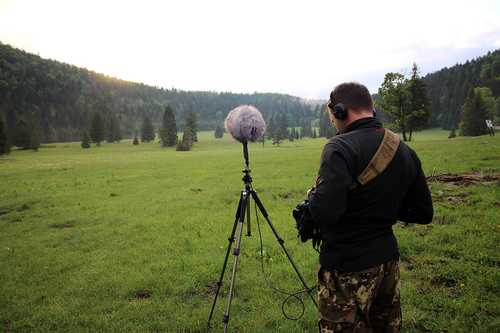
On contemplative sound and the fate of wolves
Ivo Vicic is a sound recordist and music producer whose wildlife field recordings first grabbed my attention during a period when I was learning about wolves in Europe. His recordings of elusive wolves in the forests and mountains in Croatia makes this region, which I’ve never visited, all the more mysterious and enticing.
We share an admiration for wolves and worry for this endangered species as no consensus about its protection ever emerges. It’s an old and neverending story: wolves are seen as a threat to livestock and grazing animals, leading to the final solution to shoot them down. Though we hope for better solutions to become common practice (properly trained guard dogs, financial support for losses, and education), perhaps we should first recognize our own place on this planet and adopt the goal of coexistence rather than domination. Another aspect that drew me to Ivo’s work is the way he uses negative space in. This is not only uncommon in the field recording world, but is contemplative in a way that’s antithetical to sensory pollution. In my view, negative space in soundscapes – which is especially present in recordings made at night – brings us close to nocturnal animals in particular, and allows us to feel that we can almost hear what the trees and rocks hear. I for one deeply appreciate the sense of solitude and connection in these soundscapes.
For these reasons, I’m grateful to Ivo for accepting our invitation to answer a few questions for earth.fm; it’s a pleasure to be able to share his thoughts.
Why did you start recording and how did you realize it was something for you?
I have always listened, since my early childhood. Somehow, as time passed, everything in my life went in the direction of sound. My grandma and grandpa worked in national radio, and my mother always played records when I was young.
In 1992, I started DJing in public (on turntables, of course). The techno revolution had arrived and there was no way to avoid it. But we were into ambient as well as dance floor music. And ambient (or ambient house, chill-out, etc) used numerous field recordings. Simultaneously, we (my crew, friends) started to write our own electronic music, and I was always looking for nature field recordings to be a part of our musical expression – but it wasn’t possible at that time, because of lack of equipment, so we used our synthesizers to create atmosphere instead.
At some point later, I borrowed field recording equipment from a national radio station I worked at; that’s how I started to make field recordings. I used some of those recordings in my own music production, but from the start I tried to preserve natural sound by recording it as a document, soundscape, or ambience.
For you, what is the best thing about being outdoors?
Just to be there and observe and feel everything around: energy, constant change, forces of nature, life…
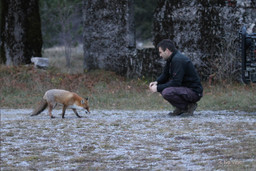
How do you usually prepare for a field recording trip?
It depends. The weather forecast is always crucial, that’s for sure.
I prepare my microphone setups according to what I’m going to record. I always have my all-rounder Sennheiser stereo mic rig with me, but if I’m going to record, say, some specific bird I take my parabolic microphone. If I go on a field recording trip for several days, I take a ton of equipment. And my batteries are always fully charged and ready to go.
Usually, I sleep in my 4×4 vehicle and always have a minimum of outdoor equipment in it. I normally take my mountain bike, too, because that makes it much easier to monitor animal trails and listen to what’s going on in the field.
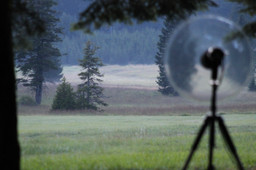
Is there a story you’d like to share?
I remember once a bat flew into my studio by mistake; the huge windows were open on summer evenings. The poor little animal was so confused that it didn’t know how to fly out. Possibly the acoustic absorbers confused his echolocation (as some acoustic absorbers work well on a range of ultrasound).
I recorded his ultrasound calls, of course. Then I went away to let him find a way out.
Do you have a favorite recording?
There are many, probably all wolf recordings. There is one with a lonely wolf which is special for me, very rare.
Where does your interest in wolves come from? How do they inspire you?
I have always been surrounded by (domestic) animals, especially German shepherd dogs, that’s why I’m sensitive to wolves. From the day I was born, I was surrounded by dogs. My dad has a local wolfdog. I have pictures of myself (as a baby) with him, somewhere. And my mum is a great dog lover, so you can imagine…
Somehow, I can feel and understand the wolves (I believe). Over the years, I’ve spent a lot of time outdoors with dogs, which I’m now missing from my life. When I see or hear the wolves, something primordial awakens in me. They are a true manifestation of the wild, a living symbol of what wilderness is. They’re special, without doubt.
Is it a goal of yours to get very close to them?
Not necessarily. I’m happy to know that they’re here with us. They’re so close, maybe some 5 to 10 km from where I’m writing this.
Anyway, it’s usually enough for me to find their trails and feel their presence in the woods. I always respect animals’ comfort or safety zone. I don’t need to chase them around; let them be undisturbed, be wild. I have witnessed many ornithologist camps and always feel sorry for the birds being ringed; they’re under so much stress during the procedure.
How did you learn to track wolves?
I’m not sure; there were always animal trails outdoors in mud, snow… Since my childhood, I started to memorize them spontaneously. When you’re with your dog in nature, well, they’re so superior at monitoring what’s happening around you. Watching your dog, you learn and start to notice things that you weren’t aware of before. I recognize many of my dogs’ behaviors in wolves. Later, I intentionally tracked wolves, their trails, paths… Learning, trying to think their way. They have their own paths in the wilderness, which usually crisscross the paths of their prey.
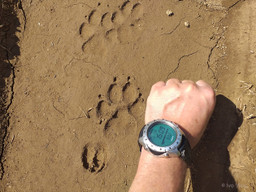
What can you share about wolves’ current status in Europe? What do you hope to see happening in the near future?
It seems things are a little better. Wolf protection under the EU is starting to have results, it seems. The wolf is coming back. Here in Croatia there were always wolves, but they’re under threat from poaching. Of course, there was protection from the state, but mostly only on paper. Poaching is a problem here, and probably still is across the EU. But ordinary people, mostly (even those living close to wolves), are OK with them. And bears and lynx; somehow, ordinary people respect those wild animals and are proud of them. I notice that, not only in Croatia but in some other EU countries too. But the majority of people are still primitive and destructive to nature in general.
I think that what field recordists and photographers and wildlife film producers are doing is very important. Taking nature closer to the public, to ordinary people, through the media or art is the best way to protect nature and wild animals. I myself have been a guest on many radio shows, on national radio networks and TV, with the sounds of wildernesses, nature, wolves, etc, and people are always amazed in a good way. Sound is so important.
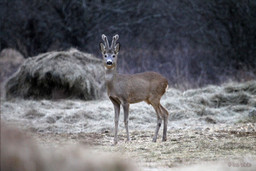
I hope, in the near future, we’re going to change our relationship with nature: find a balance. Evolve, be aware. I hope this happens with wolves, too. They’re wild and free or they’re not wolves; humans must accept that.
Nature is not an amusement park, nor a place for doing whatever you want or testing your toys and outdoor gadgets. But many of us act like it is.
What would you most like to record someday?
Whatever I can. Big sea mammals are on the top of the list. As a diver I’ve spent so much time underwater, but as a field recordist, too, in a way. Water is an amazing medium to record.
There are so many animals which I’d like to record: rainforest species, birds of paradise, primates, savanna animals… And outside of the animal kingdom, I would like to record many geophonic and anthropophonic sounds, for example tribal dances and shamanic rituals.
All photos courtesy of Ivo Vicic
Earth.fm is a completely free streaming service of 1000+ nature sounds from around the world, offering natural soundscapes and guided meditations for people who wish to listen to nature, relax, and become more connected. Launched in 2022, Earth.fm is a non-profit and a 1% for the Planet Environmental Partner.
Check out our recordings of nature ambience from sound recordists and artists spanning the globe, our thematic playlists of immersive soundscapes and our Wind Is the Original Radio podcast.
You can join the Earth.fm family by signing up for our newsletter of weekly inspiration for your precious ears, or become a member to enjoy the extra Earth.fm features and goodies and support us on our mission.
Subscription fees contribute to growing our library of authentic nature sounds, research into topics like noise pollution and the connection between nature and mental wellbeing, as well as funding grants that support emerging nature sound recordists from underprivileged communities.
